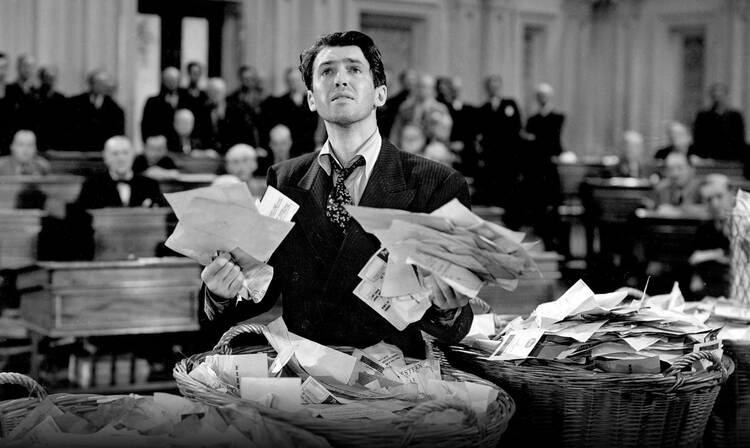Jefferson Smith (Jimmy Stewart), the newly-appointed senator for his state, receives a hero’s welcome when he first arrives in Washington, D.C. He is glad-handed, congratulated, even greeted with kisses by his fellow senator’s daughter and her socialite friends. Smith, a political neophyte, is a bit overwhelmed. Standing in the train station, he marvels: “Things sure happen fast around here, don’t they?” He has no idea; in a matter of weeks, the men who are currently celebrating him will try to destroy him.
Smith—the titular hero of “Mr. Smith Goes to Washington” (1939), directed by Frank Capra, written by Sidney Buchman and Myles Connolly, and based on a story by Lewis R. Foster— doesn’t realize that he’s a pawn in a larger game. He was appointed because the political bosses in his state think he’ll be easy to manipulate and won’t disrupt their lucrative graft schemes. They believe Smith is naïve, although maybe “innocent” is a better word. He gawks at the Capitol building like a kid on a field trip and fawns over his hero, Senator Joseph Paine (Claude Rains), blind to the fact that Paine has fallen far from the idealistic lawyer he once was.
Smith believes in the America that should be, enshrined in its founding documents and embodied by patriotic heroes of the past. His idealism is enough to soften even his aide, disillusioned Washington-lifer Clarissa Saunders (Jean Arthur). And when Smith learns about the dirty deal that his appointment is supposed to enable, his purity of conviction gives him the courage to take a stand.
Onlookers describe Smith as both Daniel in the lion’s den and David facing down Goliath. But the biblical story that this film most reminds me of is the one we will hear at Palm Sunday Mass this weekend. When Jesus enters Jerusalem, the crowds wave palm branches and hail him as “king,” which we reenact at the beginning of the liturgy. By the time we reach the Gospel, that royal title twists into mockery and even becomes the criminal charge posted above him on the cross. In both Jesus and Smith’s stories, we see that pure motives may receive worldly acclaim on the condition that don’t challenge the status quo. The powers that be will only tolerate idealism as long as it’s useful.
While Jesus was never a pawn of the powerful, I can imagine that the elites of his time looked at him the way that the comfortable senators of the film look at Smith: a country bumpkin, hopelessly naïve to the harsh realities of the world. And like Smith’s senatorial colleagues, Jesus’ contemporaries discover that an idealist can be dangerous because he refuses to accept the compromises that form the foundation of their power. An idealist imagines a better world, and that’s a threat to people who are very comfortable in this one. Power exists only to perpetuate itself; if someone challenges that power, they must be crushed before their vision can spread.
When Smith takes his stand, he finds his reputation and relationships under attack. His good name is dragged through the mud, his words silenced or twisted to make him into a laughingstock. But despite his idealism, Smith is clear-eyed about the cost of fighting the good fight. Both of Smith’s great heroes—his father (a journalist who took on a big mining company) and Abraham Lincoln—were killed by bullets to the back of the head, and the shadow of martyrdom hangs over the film. Discussing his father’s murder with Paine, Smith says: “I suppose when a fellow bucks up against a big organization like that… one man by himself can’t get very far.” Those words foreshadow the fight ahead of him and perhaps his fate. But for Smith, fighting for a lost cause isn’t about winning: It’s about having the courage to fight at all, despite the cost, because it’s the right thing to do. “[Y]ou fight harder for the lost causes than for any others,” Smith says. “Yes, you’d even die for them.”
On Palm Sunday, we reflect on what we sometimes feel is the greatest “lost cause” in history: the human race. Our history as a species is marked by violence, hatred and an inability to appreciate the beautiful existence that God gives us. Scripture shows us how, again and again, we turn away from God, devoting our worship to the idols of wealth and power. But Christ doesn’t give up on us. When he enters Jerusalem, he knows where his path will lead and that those shouts of praise will soon turn to jeers. He knows that he will give his life for people who will reject, dismiss and insult him. Almost 2,000 years later, we still refuse to follow what Smith calls “one, plain, simple rule: ‘Love thy neighbor.’” Maybe we are a lost cause. But, as this film and our faith remind us, those are the causes most worth fighting for.
“Mr. Smith Goes to Washington” is available to rent or buy on Amazon Prime and Apple TV+.








